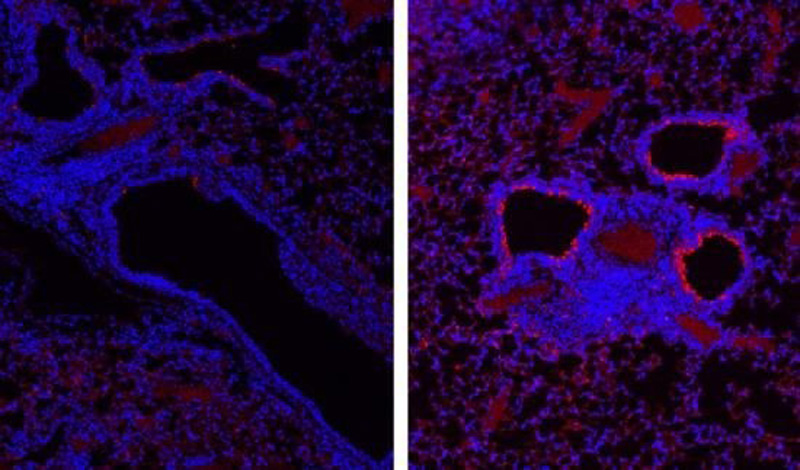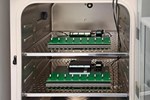RVC professor contributes to vital research on potential treatment for COVID-19
Continuing the ongoing and expanding partnership between the Royal Veterinary College (RVC) and the Francis Crick Institute, Simon Priestnall, Professor of Veterinary Anatomic Pathology at the RVC, has contributed to a significant new piece of research just published in Science which shows that a protein currently being trialled as a treatment for COVID-19 interferes with the repair of lung tissue.
The findings have been published alongside research from Harvard Medical School, which found that severe COVID-19 patients showed strong expression of this protein in their lungs. The protein, called interferon lambda, signals to surrounding lung tissue cells to switch on anti-viral defences when a virus is detected in the body. Working alongside the team from the Crick Institute, Professor Priestnall used his skills in examining the pathology of respiratory viral infections to support the findings that antiviral interferons – such as the protein under investigation – can block repair in damaged lungs. Prof Priestnall, who has researched respiratory coronavirus infections in dogs at the RVC, was able to contribute valuable insights into the project, using first-hand experience from veterinary species. The research concluded that this could prolong lung damage and increase the risk of subsequent bacterial infections.

The researchers observed that in mice with influenza an increased level of this protein in their lungs meant that the lungs’ epithelial cells multiplied less. These cells make up the lining of the airspaces in the lung and need to multiply to replace damaged cells and therefore repair damage. This was the case for mice treated with the protein experimentally and mice that had produced the protein naturally, as a result of their response to the virus. The researchers also found that cultures of human lung epithelial cells treated with this protein were less able to grow.
Professor Simon Priestnall, Professor of Veterinary Anatomic Pathology at the RVC, said: “This research is another example of the way in which the RVC’s veterinary pathologists are working together with scientists at the Francis Crick Institute on research which is furthering our understanding of COVID-19 and other viral diseases. “At the RVC, we always emphasise the need for collaboration between different disciplines to achieve the best health outcomes for animals and humans, and this vital research demonstrates just how important such an approach is.”
Jack Major, lead author of the research and PhD student in the Immunoregulation lab at the Francis Crick institute said: “Understanding how our bodies respond to infection has never been more important. Differences in our immune responses have huge implications for whether a treatment will work and what the side effects might be. “Our results suggest that before pursuing treatment with interferon lambda, doctors should consider at what stage of the disease patients are, as treatment late in infection may increase the risk of prolonged damage.”
Reference Major J, Crotta S, Llorian M, McCabe T, Gad H, Priestnall SL, Hartmann R, Wack R (2020). Type I and III Interferons Disrupt Lung Epithelial Repair during Recovery from Viral Infection. Science, 11 June 2020, doi:10.1126/science.abc2061.
Notes to editors The full study can be accessed at: https://science.sciencemag.org/content/early/2020/06/10/science.abc2061
Read more about the Immunoregulation Laboratory at the Francis Crick Institute at : https://www.crick.ac.uk/research/labs/andreas-wack
For more information please contact: Jasmin De Vivo or rvc@plmr.co.uk Press Line: 0800 368 9520
About the Royal Veterinary College
- The Royal Veterinary College (RVC) is the UK's largest and longest established independent veterinary school and is a Member Institution of the University of London.
- It was the first in the world to hold full accreditation from AVMA, EAEVE, RCVS and AVBC.
- The RVC is the top veterinary school in the UK and Europe and ranked as the world’s second highest veterinary school in the QS World University Rankings by subject, 2020.
- The RVC offers undergraduate and postgraduate programmes in veterinary medicine, veterinary nursing and biological sciences.
- In 2017, the RVC received a Gold award from the Teaching Excellence Framework (TEF) – the highest rating a university can receive.
- A research led institution with 79% of its research rated as internationally excellent or world class in the Research Excellence Framework 2014.
- The RVC provides animal owners and the veterinary profession with access to expert veterinary care and advice through its teaching hospitals and first opinion practices in London and Hertfordshire.
You may also be interested in:
-
The RVC signs scientific collaboration agreement with Forcefield Therapeutics to assess novel treatments for heart disease
The Royal Veterinary College (RVC) has signed a scientific collaboration agreement with Forcefield …

